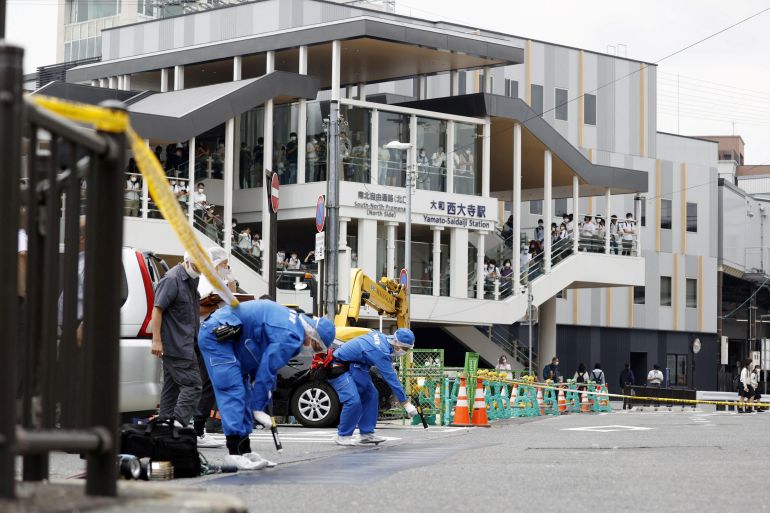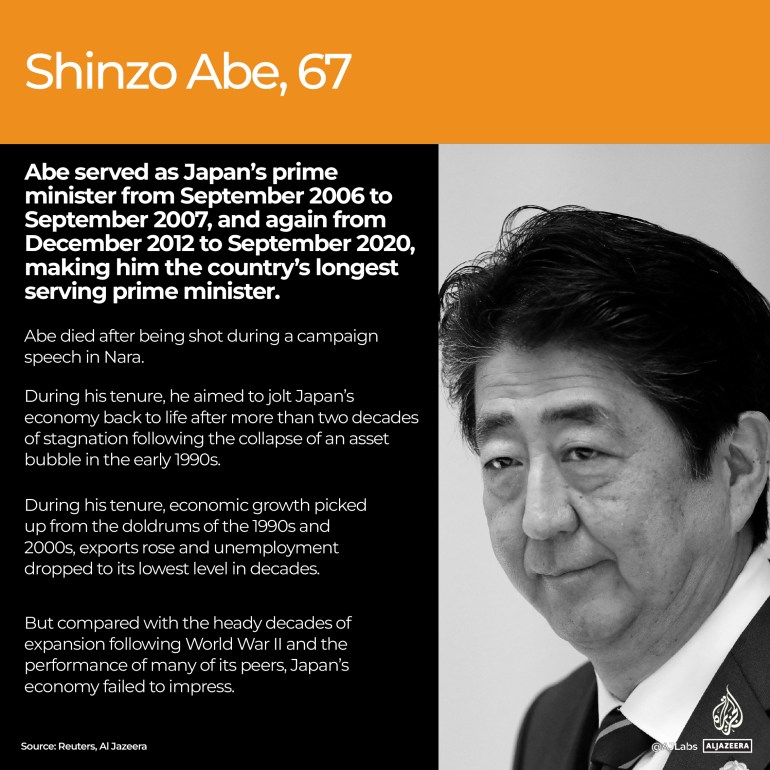Japan’s ex-Prime Minister Shinzo Abe shot during campaign event
The country’s longest serving prime minister was delivering an election campaign speech when he was attacked in Nara.

Japan’s former Prime Minister Shinzo Abe has succumbed to his wounds after being shot while delivering an election campaign speech in the city of Nara, local media reported.
The NHK broadcaster and the Kyodo news agency reported Abe’s death on Friday, hours after the 67-year-old was shot in the chest and the neck.
Keep reading
list of 4 itemsKishida critics seize on weak yen in Japan upper house election
Japan court upholds ban on same-sex marriage
Japan to attend NATO summit for first time
Earlier, Prime Minister Fumio Kishida had condemned the attack in the “strongest terms” and said he was praying “from the depths” of his heart Abe would survive.
The motive for the attack was not yet known, added Kishida, who cut short a campaign appearance in the northern prefecture of Yamagata and returned by helicopter to his official residence in the capital, Tokyo.
Video shows the moment former Japanese PM Shinzo Abe was shot from behind as he campaigned in the city of Nara. Abe was rushed to the hospital in critical condition.
Read more: https://t.co/gWJh3VaXRc pic.twitter.com/1DC7onCKAy
— Al Jazeera English (@AJEnglish) July 8, 2022
Chief Cabinet Secretary Hirokazu Matsuno told reporters Abe, who was in Nara campaigning ahead of Sunday’s election for the parliament’s upper house, had been shot at about 11:30am (02:30 GMT). “Such an act of barbarity cannot be tolerated,” Matsuno said.
Quoting Japanese police, NHK said Abe appeared to have been shot from behind with a shotgun and said its reporter on the scene heard “what sounded like a gun going off twice”.
The broadcaster aired footage showing Abe collapsed on the street, with several security guards running towards him. Abe was holding his chest when he collapsed, with his shirt smeared with blood.
A 41-year-old male suspect has been taken into custody on suspicion of attempted murder, NHK said. The suspect, who was identified as Yamagami Tetsuya, was holding a gun, which police confiscated, it added.
“This is an outrageous attack,” Koichiro Matsumoto, Japan’s deputy cabinet secretary for public affairs, told Al Jazeera. “The government strongly condemns in its utmost terms.”
Shock and condemnation
Abe served as Japan’s prime minister from December 2012 to September 2020, making him the country’s longest-serving prime minister.
Hailing from a wealthy political family that included a foreign minister father and a grandfather who served as prime minister, Abe has been best known for his signature “Abenomics” policy, which featured bold monetary easing and fiscal spending. He also bolstered defence spending after years of declines and expanded the military’s ability to project power abroad.
But he failed to achieve his cherished goal of formally rewriting the US-drafted pacifist constitution because of poor public support, while his ultra-nationalism riled the Koreas and China.

Abe had been due to stay on until late 2021, giving him an opportunity to see out one final event in his historic tenure – the postponed Tokyo 2020 Olympic Games. But in a shock announcement, he stepped down in August 2020, after a chronic health problem resurfaced. Abe has had ulcerative colitis since he was a teenager and has said the condition was controlled with treatment.
Despite stepping down, Abe has remained a dominant presence over the ruling Liberal Democratic Party (LDP), controlling one of its major factions.
The news of the shooting prompted shock and condemnation in Japan and worldwide.
The United States Ambassador to Japan Rahm Emanuel said he was “saddened and shocked” by Friday’s shooting.
“Abe-san has been an outstanding leader of Japan and unwavering ally of the United States,” he said in a statement.
Australian Prime Minister Anthony Albanese also expressed his shock at the news.
“Our thoughts are with his family and the people of Japan at this time,” he said on Twitter.
The shooting was especially “tragic and surprising” given Japan is one of the world’s safest countries, said Benoit Hardy-Chatrand, a professor at Japan’s Temple University.
“This is certainly not something we are used to seeing in Tokyo. We never have this kind of gun violence. [We have] one of the lowest rates of homicide in the world,” he told Al Jazeera.
“So this comes as a shock to everyone, especially considering the stature of the importance of the victim of Abe Shinzo, one of the most important post-war politicians for Japan.”